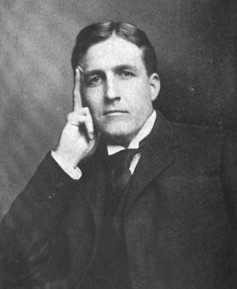Awards
- Honorary Degree - 1928
- LL.D.
- Doctor of Laws
- Commencement
- Bloomington, Indiana
- Presenter: William Lowe Bryan

Meredith Nicholson, author, politician, and diplomat, joined with Booth Tarkington, George Ade, and James Whitcomb Riley to shape Indiana’s Golden Age of Literature in the first quarter of the 20th century. His early career included work in the law office of William Wallace, where he met Lew Wallace, author of Ben Hur, and James Whitcomb Riley, who became a lifelong friend and mentor. Nicholson’s career also included various editorial positions at the Indianapolis News from 1885-1897, but it was as an author that he found fame. Nicholson’s literary career spanned nearly forty years beginning with the 1897 publication of his book of poetry, Short Flights and closing with the 1929 publication of a collection of biographical sketches called Old Familiar Faces, Nicholson’s personal favorite.
Nicholson was encouraged to pursue his writing career by James Whitcomb Riley, who gave him support and friendship that Nicholson never forgot. He wrote a 1906 poem, “To James Whitcomb Riley” and spoke at the cornerstone dedication of the Indianapolis Public Library in March 1916, built on property that Riley owned and gave to the city to build a library and gave a kindly tribute to the “best loved man our state has produced.” He also was one of 21 Incorporators for the James Whitcomb Riley Memorial Association established in 1921 to lead the fund-raising and building of Riley Hospital for Children that opened in November 1924. Nicholson championed Riley and spoke up to encourage Hoosiers of all ages to donate whatever they could to build the hospital.
Nicholson turned to Democratic party politics in 1928, serving one term (1928-1930) as a reform city councilman in Indianapolis. He rose through the Democratic party ranks, serving years with dedication and was rewarded by President Franklin Roosevelt with appointments as minister to Paraguay (1933-34), Venezuela (1934-1938), and Nicaragua (1938-1941). Recurring health problems prompted Nicholson’s retirement from the foreign service in 1941 and upon his return to Indiana, he continued to write for local newspapers and to support the Allied effort during World War II. Between 1903-1925, Nicholson published 29 books, most of them novels, but also three collections of essays, a second book of poetry, and even a play that he co-authored. While known for popular light romances, Nicholson’s historical essays and his analyses of current events published in newspapers and magazines were among his most valuable writings. Three books by Nicholson published during this era were national bestsellers: The House of a Thousand Candles (#4 in 1906), The Port of Missing Men (#3 in 1907), and A Hoosier Chronicle (#5 in 1912).